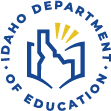shannon dunstan
Results Driven Accountability and Early Childhood Coordinator
Idaho State Department of Education
P.O. Box 83720 Boise, Idaho 83720
208-332-6908 (Office)
208-703-1660 (Cell)
sdunstan@sde.idaho.gov
 Idaho
State Department of Education
Idaho
State Department of Education
650 W. State Street
PO Box 83720
Boise, ID 83720-0027